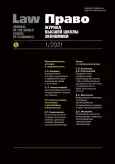Мусульманское право в контексте правогенеза
- Авторы: Муромцев Г.1
-
Учреждения:
- Кафедра теории права и государства Юридического института Российского университета дружбы народов
- Выпуск: Том 14, № 1 (2021)
- Страницы: 80-106
- Раздел: Правовая мысль: история и современность
- URL: https://journals.rcsi.science/2072-8166/article/view/318095
- DOI: https://doi.org/10.17323/2072-8166.2021.1.80.106
- ID: 318095
Цитировать
Полный текст
Аннотация
Об авторах
Геннадий Муромцев
Кафедра теории права и государства Юридического института Российского университета дружбы народов
Email: kafedra-teoria@yandex.ru
Профессор, доктор юридических наук
Список литературы
- Alekseev S.S. (1994) Theory of law. Moscow: BEK, 221 p. (in Russian)
- Alekseev V.V. (ed.) (2014) Theory and methodology of law. Volgograd: Uchitel', 503 p. (in Russian)
- Allott A.N. (1965) Law and language. London: University press, 31 p.
- Arsanukaeva M. (2004) Mashaby — schools of Islamic legal thought. Sovremennoe parvo, no 7, pp. 52-60 (in Russian)
- Arsanukaeva M. (2004) Sunni Mashaby: origin and development. Religiya i pravo, no 2, pp. 24-26 (in Russian)
- Artemov V.U. (2007) Sources and doctrines of Muslim law. Zhurnal rossiyskogo prava, no 3, pp. 128-136 (in Russian)
- Belomestnova N.V. Plebanek O. V. (2012) Conscience and culture in scholar worldview. Voprosy filosofii, no 10, pp. 43-52 (in Russian)
- Chestnov I.L. (2006) Historical causes of state and law. In: Teoriya gosudarstva i prava. Saint Petersburg: Peter Press, pp. 41-95 (in Russian)
- Darvin Ch. (1986) Origin of Species by Means of Natural Selection. Moscow: Prosve-chenie, 484 p. (in Russian)
- Drobischevskiy S.A. (1994) Political organization of society and law. Doctor of Juridical Sciences Summary. Saint Petersburg, 40 p. (in Russian)
- Dumanov H.M., Perschiz A.I. (2000) Mononorm and initial law. Gosudarstvo i pravo, no 1, pp. 98-104 (in Russian)
- Engels F. (1989) Origin of family, private property and state. Moscow: Politizdat, 240 p. (in Russian)
- Gegel G. (2009) Philosophy of law. Moscow: Nauka, 415 p. (in Russian)
- Gurevich A.Ya. (1984) Categories of medieval culture. Moscow: Nauka, 350 p. (in Russian)
- Ismaylov A.Sh. (2009) Mashaby in Islam. Islamovedenie, no 2, pp. 15-27.
- Jung K. (1998) Psychology of the Unconscious. Moscow: Pedagogika, 397 p. (in Russian)
- Kartaschov V N. (2018) State and law theory. Yaroslavl: University, 359 p. (in Russian)
- Khaidarova M.S. (1984) Major theories and schools in Muslim law. Muslim Law (structure and institutions). V.E. Chirkin, L.R. Sjukiyainen (eds.). Moscow: Nauka, pp. 38-48 (in Russian)
- Khallyak V. (2020) History of Islamic legal theories. Moscow: HSE, 463 p. (in Russian)
- Kolesnikov P.M. (2012) Muslim law in legal systems of the Middle East. Moscow: Russian Legal Academy, 142 p. (in Russian)
- Komarov S.A. (1998) General theory of state and law. Moscow: Jurist, 406 p. (in Russian)
- Korel'skiy V.M., Perevalov V.D. (1998) Theory of state and law. Moscow: Nauka, 450 p. (in Russian)
- Kubbel L. (1988) Essays on political ethnography. Moscow: Nauka, 268 p. (in Russian)
- Kulanzh F. de (1903) Ancient civil community. Moscow: Sytin, 405 p. (in Russian)
- Leontyev A.N. (1971) Necessities, motives and emotions. Moscow: MGU, 65 p. (in Russian)
- Lotman Yu.M. (1978) Phenomenon of culture. Uchenie trudi Tartusskogo universiteta, no 10, pp. 3-17 (in Russian)
- Machin I.F. (1999) On the origin of law. In: Issues of theory state and law. M. N. Marchenko (ed.). Moscow: MGU, pp. 81-99 (in Russian)
- Maltsev G.V. (1999) (a) Customary theory and common law. In: Law in Russia: theory, history and applying. Rostov: University, pp. 7-94 (in Russian)
- Maltsev G.V. (1999) (b) Origin and early forms of law and state. In: Aspects of theory of state and law. V. S. Nersesjants (ed.). Moscow: Norma, pp. 27-115 (in Russian)
- Morozova L.A. (2015) Theory of state and law. Moscow: Yurist, 414 p. (in Russian)
- Perschiz A.I. (1979) Aspects of normative ethnography. Issledovaniya po obschei etnografii. Moscow: Nauka, pp. 210-240 (in Russian)
- Pigolkin A.S. (ed.) (2008) General theory of law. Moscow: Prospekt, 485 p. (in Russian)
- Piotrovskiy M.B. (2008) Fikh. Schariat. Islam. A manual. Moscow, pp. 110-111, 132-133 (in Russian)
- Rasskasov L.S. (2015) Theory of state and law. Moscow: 650 p. (in Russian)
- Roe M. (2019) Islamic law: history and modern times. Moscow: Medina, 576 p. (in Russian)
- Rubinschtein S.L. (2015) Basics of psychology. Saint Petersburg: Piter, 705 p. (in Russian)
- Saidov A.H. (2008) Hidoya by Burharuddin Marginani as a unique juridical monument of Islam. Moscow: Wolters Kluwer, pp. 15-49 (in Russian)
- Schalyutin B.S. (2011) Genesis of law as a factor of the development of society and humanity. Voprosi filosofii, no 11, pp. 51-62 (in Russian)
- Sechenov I.M. (1952) Selected works. Moscow: Meditsina, 235 p. (in Russian)
- Sinitsina I.E. (1978) Customary law in modern Africa. Moscow: Nauka, 285 p. (in Russian)
- Sukiyainen L.R. (1991) Al-Fikh. Sharia. In: Islam. Encyclopedia. Moscow: Medina, pp. 254-257, 292-294 (in Russian)
- Sukiyainen L.R. (1997) Schariat and muslim legal culture. Moscow: Nauka, 99 p. (in Russian)
- Sukiyainen L.R. (2001) Fetva. Fiqh. Shariat. In: Yuridicheskaya entsiklopediya. Moscow: Yurist, pp. 1153-1156, 1197-1198 (in Russian)
- Sukiyainen L.R. (2018) Fiqh as a reflection of legal features of Islamic law. Pravo. Zhurnal Vysshey shkoly ekonomiki, no 3, pp. 50-80 (in Russian)
- Sukiyainen L.R. (2019) Fiqh as a source of modern law in Arabic countries. Pravo. Zhurnal vysshey shkoly ekonomiki, no 4. pp. 222-245 (in Russian)
- Valeev L.Zh. (1974) Common law and initial stages of its genesis. Pravovedenie, no 6, pp. 71-79 (in Russian)
- Vasilyev L.S. (1999) A history of Eastern religions. Moscow: Nauka, 415 p. (in Russian)
- Vengerov A.B. (1983) Ethnography and archeology for legal science. Sovetskoe gosudarstvo i pravo, no 3, pp. 28-36 (in Russian)
- Viljunas V.K. (1986) Psychological mechanisms of biological motivation. Moscow: MGU, 207 p. (in Russian)
Дополнительные файлы








